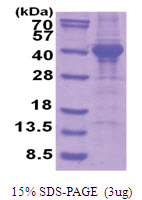Napsin-A (64-420, His-tag) Human Protein
Other products for "NAPSA"
Specifications
| Product Data | |
| Species | Human |
| Expression Host | E. coli |
| Expression cDNA Clone or AA Sequence |
MGSSHHHHHH SSGLVPRGSH MGSKPIFVPL SNYRDVQYFG EIGLGTPPQN FTVAFDTGSS NLWVPSRRCH FFSVPCWLHH RFDPKASSSF QANGTKFAIQ YGTGRVDGIL SEDKLTIGGI KGASVIFGEA LWEPSLVFAF AHFDGILGLG FPILSVEGVR PPMDVLVEQG LLDKPVFSFY LNRDPEEPDG GELVLGGSDP AHYIPPLTFV PVTVPAYWQI HMERVKVGPG LTLCAKGCAA ILDTGTSLIT GPTEEIRALH AAIGGIPLLA GEYIILCSEI PKLPAVSFLL GGVWFNLTAH DYVIQTTRNG VRLCLSGFQA LDVPPPAGPF WILGDVFLGT YVAVFDRGDM KSSARVGLAR ARTRGADLGW GETAQAQFPG
|
| Tag | His-tag |
| Predicted MW | 40.9 kDa |
| Concentration | lot specific |
| Purity | >90% by SDS - PAGE |
| Presentation | Purified |
| Buffer | Presentation State: Purified State: Liquid purified protein Buffer System: 20 mM Tris-HCl (pH 8.0) containing 10% glycerol |
| Preparation | Liquid purified protein |
| Protein Description | Recombinant human NAPSA protein, fused to His-tag at N-terminus, was expressed in E.coli. |
| Storage | Store undiluted at 2-8°C for one week or (in aliquots) at -20°C to -80°C for longer. Avoid repeated freezing and thawing. |
| Stability | Shelf life: one year from despatch. |
| Reference Data | |
| RefSeq | NP_004842 |
| Locus ID | 9476 |
| UniProt ID | O96009 |
| Cytogenetics | 19q13.33 |
| Synonyms | KAP; Kdap; NAP1; NAPA; SNAPA |
| Summary | This gene encodes a member of the peptidase A1 family of aspartic proteases. The encoded preproprotein is proteolytically processed to generate an activation peptide and the mature protease. The activation peptides of aspartic proteinases function as inhibitors of the protease active site. These peptide segments, or pro-parts, are deemed important for correct folding, targeting, and control of the activation of aspartic proteinase zymogens. The encoded protease may play a role in the proteolytic processing of pulmonary surfactant protein B in the lung and may function in protein catabolism in the renal proximal tubules. This gene has been described as a marker for lung adenocarcinoma and renal cell carcinoma. [provided by RefSeq, Feb 2016] |
| Protein Families | Druggable Genome, Protease |
| Protein Pathways | Lysosome |
Documents
| FAQs |
| SDS |
Resources
Recombinant Protein Resources |
{0} Product Review(s)
0 Product Review(s)
Submit review
Be the first one to submit a review
Product Citations
*Delivery time may vary from web posted schedule. Occasional delays may occur due to unforeseen
complexities in the preparation of your product. International customers may expect an additional 1-2 weeks
in shipping.






























































































































































































































































 Germany
Germany
 Japan
Japan
 United Kingdom
United Kingdom
 China
China
